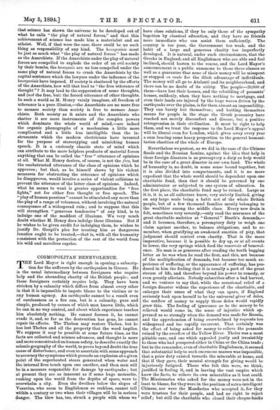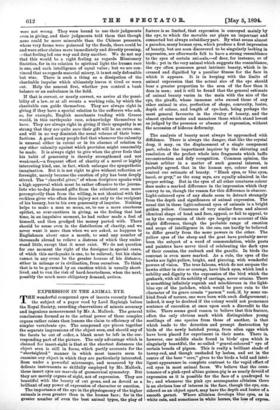COSMOPOLITAN BENEVOLENCE.
THE Lord Mayor is right enough in opening a subscrip- tion for the sufferers by the earthquakes in Greece. He is the usual intermediary between foreigners who require help and the abounding charity of the British people; and these foreigners certainly require help. They have been stricken by a calamity which differs from almost every other in that it is impossible to impute blame to the victims or to any human agency. An earthquake cannot be a result even of carelessness as a fire can, but is a calamity, pure and simple, produced by causes of which man knows little, which he can in no way control, and about which experience teaches him absolutely nothing. He cannot foresee it, he cannot evade it, and, so far as the destruction has gone, he cannot repair its effects. The Theban may restore Thebes, but he has lost Thebes and all the property that the word implies. We suppose it may be possible at some future time, as the facts are collected and science advances, and thought is more and more concentrated on human safety, to describe exactly the seismic geography of the world, to prove beyond doubt the true cause of disturbance, and even to ascertain with some approach to accuracy the symptoms which precede an explosion at a given point of the superheated steam generated when water and the internal fires touch upon one another, and then men will be in a measure responsible for damage by earthquake ; but at present they are as innocent as if some huge meteorite, rushing upon the world from the depths of space, were to overwhelm a city. Even the dwellers below the slopes of Vesuvius, who seem to Englishmen so reckless, cannot tell within a century or two when their villages will be in serious danger. The blow has, too, struck a people with whom we have close relations, if they be only those of the sympathy begotten by classical education, and they have no friends more immediate who can assist them sufficiently. The country is too poor, the Government too weak, and the habit of a large and generous charity too imperfectly developed. It is natural, under such circumstances, that the Greeks in England, and all Englishmen who are able and feel inclinedt should hasten to the rescue, and the Lord Mayor's announcement is a public summons to those three classes as well as a guarantee that none of their money will be misspent or stopped en route for the illicit advantage of individuals. The money will all go to Atalanti and its neighbourhood, and there can be no doubt of its utility. The people-20,000 of them—have lost their houses, and the rebuilding of peasants' houses, suddenly, when they have nothing to mortgage, and even their lands are injured by the huge waves driven by the earthquake over the plains, is for them almost an impossibility. They can barely but themselves ; and hutting themselves means for people in the stage the Greek peasantry have reached not merely discomfort and disease, but a positive retrogression in their civilisation. It must be right to help them, and we trust the response to the Lord Mayor's appeal will be liberal even for London, which gives away every year a sum bearing some heavy proportion to the general humani- tarian charities of the whole of Europe.
Nevertheless we protest, as we did in the case of the Chinese floods and the Russian famine, against the idea that help in these foreign disasters is as peremptory a duty as help world be in the case of a great disaster in our own land. The whole of humanity is, no doubt, in some sense bound together, but it is also divided into compartments, and it is no more expedient that the whole world should be dependent upon one charitable fund, than that it should be governed by one administrator or subjected to one system of education. In the first place, the charitable fund may be ruined. Large as it is, it is, as all collectors know, very strictly limited, giving on any large scale being a, habit not of the whole British people, but of a few thousand families mostly belonging to the wealthier among the middle class. Every new drain is felt, sometimes very severely,—only read the murmurs of the great charitable societies at " General" Booth's demands,— and it becomes, therefore, a peremptory duty to weigh one claim against another, to balance obligations, and to re- member, when gratifying an awakened emotion of pity, that judgment should control even charity. That is the more' imperative, because it is possible to dry up, or at all events to lower, the very springs which feed the reservoir of benevol- ence. No man is as generous after reading the tenth begging letter as he was when he read the first, and this, not because of the multiplication of demands, but because too much ex- perience of suffering, or the appearance of suffering, has pro- duced in him the feeling that it is usually a. part of the great stream of life, and therefore beyond his power to remedy, or even greatly alleviate. Nobody subscribes after a bad harvest, and we venture to say that, while the occasional relief of a foreign disaster widens the experience of the charitable, and enlarges their sense of what they can spare, if England seriously took upon herself to be the universal giver of doles, the outflow of money to supply those doles would rapidly grow thin. The feeling of ignorance as to the misery to be relieved would come in, the sense of injustice which op- pressed us so strongly when the demand was made for Russia, and the apprehension of being overwhelmed by requests too widespread and too rapidly recurrent. That certainly was the effect of being asked for money to relieve the peasants ruined by the overflow of the Yellow River. Theirs was a most pitiable case, and one which appealed justly and irresistibly to those who had prospered either in China or the China trade; but to the remainder, even of charitable Englishmen, it seemed that substantial help to such enormous masses was impossible, that a prior duty existed towards the miserable at home, and that if they gave, their mental strength for giving would be injuriously fatigued. Those who felt this were, we think, justified in feeling it, and in leaving the vast empire which knew the facts, to relieve its own miserables as it best could. The Missionaries who asked for the money were not in the least to blame, for they were in the position of extra-intelligent Chinese, nor were the Mandarins who accepted it, for they were trustees for their people, and had no right to reject relief ; but still the charitable who closed their cheque-books
were not wrong. They were boand to use their judgments even in giving, and their judgments told them that though none could be more miserable than the Chinese peasants, whose very farms were poisoned by the floods, there could be and were other claims more immediately and directly pressing, —that feeling led one way and duty another. We do not say that this would be a right feeling as regards Missionary Societies, for in its relation to spiritual light the human race is one, and each intelligence of equal value ; but we are con- vinced that as regards material misery, it is not only defensible but wise. There is such a thing as a dissipation of the charitable impulse which ultimately leaves it tired or worn out. Help the nearest first, whether you control a bank balance or an ambulance in the field.
If that is correct, or nearly correct, we arrive at the possi- bility of a law, or at all events a working rule, by which the charitable can guide themselves. They are always right in giving if they have a special relation to the sufferers who ask, as, for example, English merchants trading with Greece would, in this earthquake case, acknowledge themselves to have. They are always right in giving if their sympathy is so strong that they are quite sure their gift will be an extra one, and will in no way diminish the usual volume of their bene- factions. A good many people feel that whenever the calamity is unusual either in extent or in its absence of relation to any other calamity against which provision might reasonably be made. It is always right to give when the giver feels that his habit of generosity is thereby strengthened and not weakened,—a frequent effect of charity of a novel or highly interesting kind, one, in fact, which enlarges the sympathetic imagination. But it is not right to give without reflection or foresight, merely because the emotion of pity has been deeply stirred. The "cheerful giver," of whom Scripture speaks with a high approval which must be rather offensive to the journa- lists who to-day demand gifts from the reluctant even more peremptorily than from the willing, is not identical with the reckless giver who often does injury not only to the recipient of his bounty, but to his own generosity of impulse. Nothing helps to make a man so mean, or, to use a more courteous epithet, so over-cautious in giving, as the feeling that last time, in an impulsive moment, he had rather made a fool of himself, and then grudged the money parted with. There should be sense even in the distribution of charity, and we never want it more than when we are asked, as happens to Englishmen about once a month, to send any number of thousands abroad to relieve a distress of which they under- stand little, except that it must exist. We do not question for one moment the right of the foreigner in special cases, of which this earthquake is one, to be relieved; but his claim cannot in any event be the greater because of his distance, either in mileage or in civilisation, from ourselves. To think that is to be governed by an emotion which is usually short- lived, and to run the risk of hard-heartedness, when the next, possibly the much more obligatory demand, arrives.







































 Previous page
Previous page